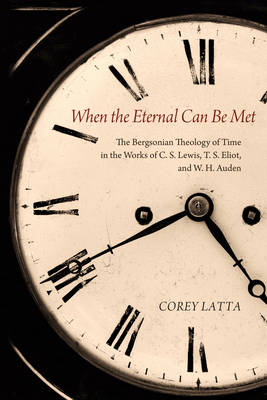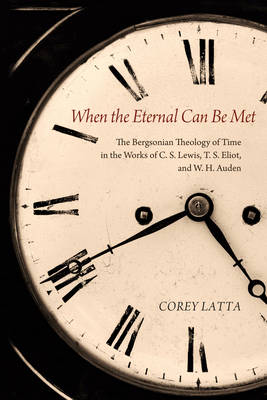
- Afhalen na 1 uur in een winkel met voorraad
- Gratis thuislevering in België vanaf € 30
- Ruim aanbod met 7 miljoen producten
- Afhalen na 1 uur in een winkel met voorraad
- Gratis thuislevering in België vanaf € 30
- Ruim aanbod met 7 miljoen producten
Zoeken
Omschrijving
When the Eternal Can Be Met excavates the philosophy behind the theology of the twentieth century's most prominent Christian writers: C. S. Lewis, T. S. Eliot, and W. H. Auden. These three literary giants converted to Christianity within little more than a decade of one another, and interestingly, all three theological authors turned to the theme of time. All three authors also came to remarkably similar conclusions about time, positing that the temporal present moment allowed one to meet the eternal. Decades before Lewis, Eliot, and Auden sought to creatively construct a fictive or poetic theology of time, the prominent philosopher Henri Bergson wrote about time's power to transform an individual's emotional and spiritual state, a theory well known by Lewis, Eliot, and Auden. When the Eternal Can Be Met argues that one cannot fully understand Lewis, Eliot, and Auden's theology of time without understanding Bergson's theories. From the secular philosophy of Bergson dawned the most important works of literary theology and treatments of time of the twentieth century, and in the Bergson-influenced literary constructs of Lewis, Eliot, and Auden, a common theological articulation sounds out--time present is where humans meet God. ""This study is yet more proof that C. S. Lewis is finally coming into his deserved recognition as a formidable twentieth-century author and intellect. Latta's fine study breaks new ground in identifying how the 'dinosaur' Lewis also belonged to his own age."" --Jameela Lares, Professor of English, University of Southern Mississippi ""It is rare to find a thinker who transcends disciplines in such a seamless way. Latta's work is theologically deep, philosophically sound, and literarily astute. Many pastors may not readily see the implications of a philosophy of 'time' as it relates to ministry, but When the Eternal Can Be Met wisely demonstrates the significance for any thoughtful Christian. This book nourishes my soul, equips my mind, and gives me apt words to speak to my congregation."" --Jim Shultz, Millennial Pastor, Hope Church ""Latta's work here is important--not least because it helps place C. S. Lewis in context with his modernist contemporaries. For too long have scholars read Lewis in isolation from the thinkers to whom he responded. When the Eternal Can Be Met helps paint a picture of Lewis, who wrote in the same world and about the same ideas with which Bergson, Auden, and Eliot wrestled."" --Armond Boudreaux, Assistant Professor, East Georgia State College Corey Latta is currently Vice President of Academics at Visible Music College in Memphis, TN. He is the author of Election and Unity in Paul's Epistles to the Romans (2009) and Functioning Fantasies: Theology, Ideology, and Social Conception in the Fantasies of C. S. Lewis and J. R. R. Tolkien (2010).
Specificaties
Betrokkenen
- Auteur(s):
- Uitgeverij:
Inhoud
- Aantal bladzijden:
- 234
- Taal:
- Engels
Eigenschappen
- Productcode (EAN):
- 9781498268851
- Verschijningsdatum:
- 14/04/2014
- Uitvoering:
- Hardcover
- Formaat:
- Genaaid
- Afmetingen:
- 152 mm x 229 mm
- Gewicht:
- 485 g

Alleen bij Standaard Boekhandel
+ 138 punten op je klantenkaart van Standaard Boekhandel
Beoordelingen
We publiceren alleen reviews die voldoen aan de voorwaarden voor reviews. Bekijk onze voorwaarden voor reviews.











